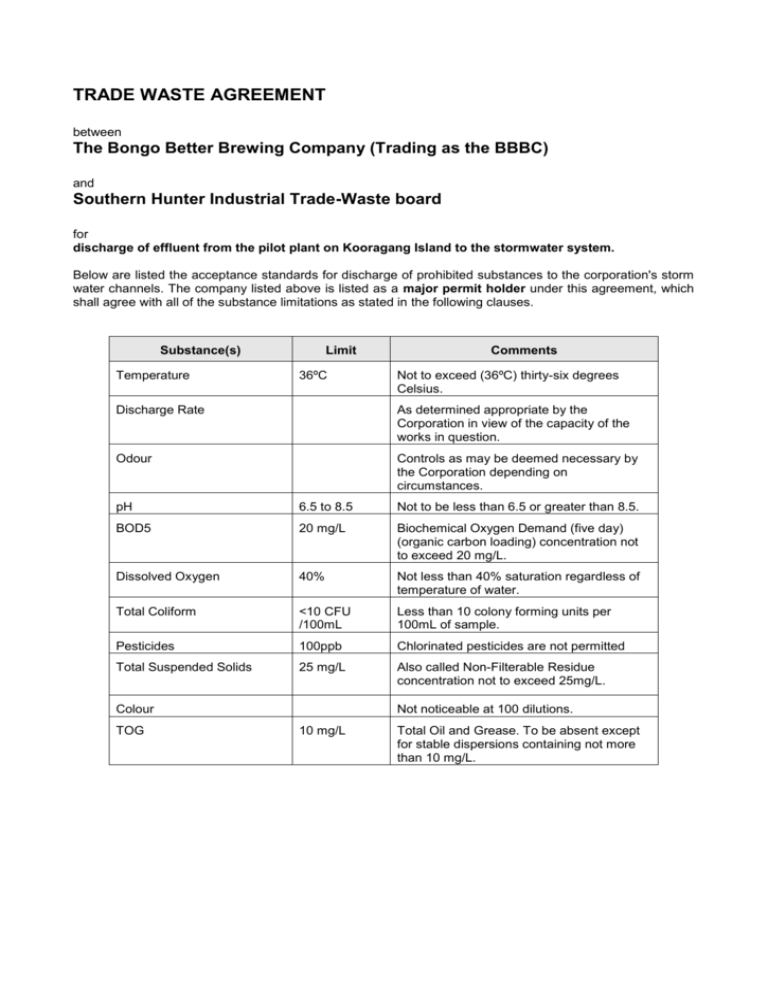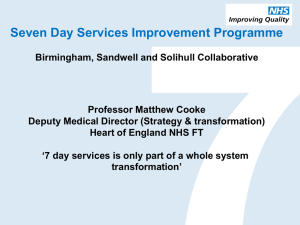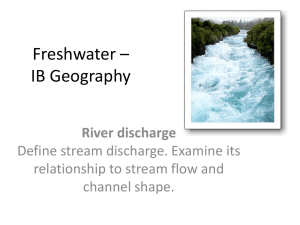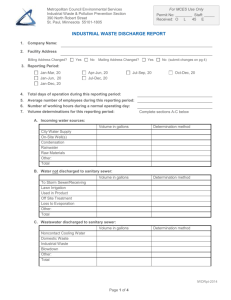Trade waste agreement - Bongo Better Brewing Company
advertisement

TRADE WASTE AGREEMENT between The Bongo Better Brewing Company (Trading as the BBBC) and Southern Hunter Industrial Trade-Waste board for discharge of effluent from the pilot plant on Kooragang Island to the stormwater system. Below are listed the acceptance standards for discharge of prohibited substances to the corporation's storm water channels. The company listed above is listed as a major permit holder under this agreement, which shall agree with all of the substance limitations as stated in the following clauses. Substance(s) Temperature Limit 36ºC Comments Not to exceed (36ºC) thirty-six degrees Celsius. Discharge Rate As determined appropriate by the Corporation in view of the capacity of the works in question. Odour Controls as may be deemed necessary by the Corporation depending on circumstances. pH 6.5 to 8.5 Not to be less than 6.5 or greater than 8.5. BOD5 20 mg/L Biochemical Oxygen Demand (five day) (organic carbon loading) concentration not to exceed 20 mg/L. Dissolved Oxygen 40% Not less than 40% saturation regardless of temperature of water. Total Coliform <10 CFU /100mL Less than 10 colony forming units per 100mL of sample. Pesticides 100ppb Chlorinated pesticides are not permitted Total Suspended Solids 25 mg/L Also called Non-Filterable Residue concentration not to exceed 25mg/L. Colour TOG Not noticeable at 100 dilutions. 10 mg/L Total Oil and Grease. To be absent except for stable dispersions containing not more than 10 mg/L. Notwithstanding the above, the discharge of prohibited substances to the Corporation's stormwater system will be permitted only in exceptional circumstances and after the Applicant has received permission in writing from the EPA. It should be noted that because the contents of stormwater drains do not receive treatment prior to discharge to receiving waters, approval for discharge to the Corporation's stormwater system will only be given under exceptional circumstances with written permission from the EPA and the Corporation, but when this does occur it will be subject to the following charges: Permit Fees – As per fees listed in the Schedule of Fees and Charges. Analytical Fees – As per fees for discharge to the Corporation's sewerage system. Inspection Fees– As per fees for discharge to the Corporation's sewerage system for Major Permit Discharger. Please note that the following conditions apply to the discharge of waste water to the Corporation’s sewer system. Strength Fees The discharge of trade wastewater to the sewerage system places an additional load on that system. This additional load is created by both the concentration (strength) of the substances discharged, and their total mass (weight). Trade waste strength charges are applied to cover the costs of this additional loading for each individual customer according to the wastewater discharge. Biochemical Oxygen Demand/Non-Filterable Residue Fees will be charged based on treatment costs of the strength of waste where the sample results for BOD 5 are greater than 20mg/L or NFR is greater than 200 mg/L. The Corporation considers that this strength load and additional costs are over that which would be incurred by acceptance of a similar quantity of purely domestic sewerage. Phosphorus Fee Fees will be charged where the strength of phosphorus is greater than 12 mg/L, the deemed domestic concentration of effluent discharged. Heavy Metal Charge Metals accumulate in the wastewater treatment bio-solid waste sludge. High levels of these metals degrade the quality and re-use of these materials. The discharge to the environment is also restricted by the EPA within the discharge licences with Southern Hunter Industrial Trade-Waste Board and the charging of load based license fees. Charges are based on total mass of metals discharged to the Corporation's sewer. Miscellaneous Charge Fees shall be determined by the Corporation for each particular prohibited substance discharged and shall be specified in the Permit. Southern Hunter Industrial Trade-Waste Board Policy – Revised September 2002



